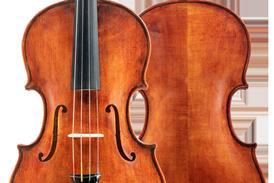- More from navigation items
- Home
- News
- For Subscribers
- Student Hub
- Playing Hub
- Podcast
- Lutherie
- Magazine
- Magazine archive
- Whether you're a player, maker, teacher or enthusiast, you'll find ideas and inspiration from leading artists, teachers and luthiers in our archive which features every issue published since January 2010 - available exclusively to subscribers. View the archive.
- Jobs
- Shop
- Directory
- Contact us
- Subscribe
- Competitions
- Reviews
- Debate
- Artists
- Accessories
Female luthiers: And justice for all?

In light of the #MeToo movement, women from all walks of life have been reporting incidents of sexist behaviour in their workplaces. Is a violin workshop any different? Femke Colborne discusses the question with a range of female luthiers – and gains a grim perspective of the industry
Gudrun Kremeier is, by any standards, a highly successful violin maker. Born in Germany and now based in the Netherlands, she runs a thriving business and is active in several international associations. But there is something, she believes, that makes her success even more notable: the fact that she is a woman. She recalls an incident from her time as a student in Mittenwald: shortly after she graduated in 1992, the school appointed a new director. One of his first comments was that it would be a great idea for the school to attract more female students, because they would only go on to have babies and quit the profession, meaning less competition for the men. ‘I was really shocked, but that was how it was,’ she says. ‘The reputation of girls was not very high. I was a bit annoyed. I thought, why do you judge me by my gender? I want to learn in the same way as my male colleagues.’
Stories like Kremeier’s are not hard to come by. One anonymous source told me that she has frequently encountered challenges related to her gender – all the way up to sheer sexual harassment. For example, she recalls a particularly troubling incident from her time as a violin making student: ‘One of the teachers made a lot of very sexist remarks. He was often hitting on the women and making comments about their appearance. Once, I asked him a question, and he said, ‘I might answer that if you come over to my house and my workshop,’ wink wink. I said no, and he got quite angry with me. He took me aside and said, you know, when someone makes a suggestion like that, you shouldn’t just say no.’
She has a whole inventory of anecdotes from more recently in her career: ‘At one conference, I was with a group and we were chatting about something neutral when a guy brought up the subject of my “tits”, a propos of nothing.’ At another event, a man started speculating about her vagina out of nowhere. At a competition, in a feedback session, one of the judges started by critiquing her instrument and ended by critiquing her personal appearance. ‘I’ve spoken to other women and they have these problems too,’ she says. ‘In a professional setting, when you get a zinger like that, you feel stripped of your identity as a professional person and reduced to a bag of physical attributes. Your worth is reframed to just that. It takes mental energy to shrug all of that off.’
Already subscribed? Please sign in
Subscribe to continue reading…
We’re delighted that you are enjoying our website. For a limited period, you can try an online subscription to The Strad completely free of charge.
* Issues and supplements are available as both print and digital editions. Online subscribers will only receive access to the digital versions.




























